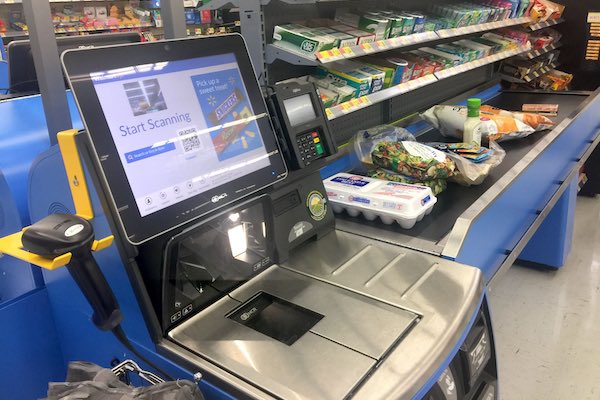
On October 12, 2021 a United States federal judge in Maryland ruled that Walmart does not have to make its self-check kiosks accessible to blind shoppers. This is a disappointing result in a case that started when a Walmart employee stole $40.00 from two blind shoppers while the employee was assisting them with the inaccessible self-check kiosk.
Read the 32 page October 12, 2021 Court Opinion in the Walmart kiosks case.
Ironically, it was an audio aspect of the kiosk that alerted plaintiffs Morales and Boyd that their money had been taken. According to the court opinion: “When they completed their transaction with the employee’s assistance, the automated kiosk declared: “don’t forget your cash.” It was only then that they discovered the clerk had used the cash back feature to take the $40.00.
The case was filed under the Americans with Disabilities Act (ADA) in October 2018. It was brought by the National Federation of the Blind, its Maryland affiliate, the 2 blind people whose money was stolen, and one other blind Walmart shopper. [Read the October 18 press release about the case filing]
A year later, in October, 2019, the judge rejected Walmart’s effort to throw the case out of court at an early stage. The past two years were spent in discovery (gathering information through depositions and other means). Then both Walmart and the NFB asked the judge to rule in their favor on all the evidence collected.
In last week’s opinion the judge ruled for Walmart.
What does the court opinion say?
The bottom line of the court’s 32 page opinion is on page 23, where the court says that
Staff assistance is sufficient to provide effective communication in a retail transaction. NFB v. Walmart opinion, page 23
I’ve emphasized the word “retail” in the quote above because it is very important to the judge’s thinking. This case is only about shopping kiosks in a retail setting. A little later in the opinion the judge writes:
Comparatively, in circumstances with heightened expectations of privacy, assistance from a qualified reader may not be sufficient. . . .Courts now generally recognize that a denial of private and independent voting constitutes a denial of meaningful access” to the electoral process.”
The judge found that “the only inherently private action involved in self-checkout is the entry of a consumer’s financial information, such as a debit card PIN.” Because the self-check included a tactile keypad that allowed independent PIN-entry, and because staff was trained to direct blind customers to that keypad, the judge felt that privacy was protected.
ADA Requirements and “Preference”
The Americans with Disabilities Act requires retailers like Walmart to provide effective communication to disabled people. The technical term is that a company has to offer “auxiliary aids and services,” and one example of an auxiliary aid and service for blind people is a “qualified reader.” The judge said that Walmart met its obligation by training staff to help blind people with the inaccessible technology:
Although blind patrons may prefer an independently accessible kiosk, Walmart has the final authority to “choose among various alternatives, as long as the result is effective communication.
Oh, but accessibility is so much more than preference! I have worked in the accessible technology space since 1995. And over these many years I have learned from blind friends and colleagues the significant ways in which accessibility is not simply a matter of preference.
Accessibility is inclusion. Accessibility is participation. And accessibility is independence. Accessibility is privacy — not just privacy to enter a PIN number, but privacy while engaging with technology in all its forms. Accessibility is not having to ask for help, and not being forced to spend more time than needed.
Accessibility is being part of the 21st century.
I appreciate the NFB and its lawyers at Brown Goldstein and Levy for bringing their ethical and stellar legal skills to this issue. I wish the result had been different.
What does this opinion mean for the future of kiosk accessibility?
The judge’s opinion can be appealed. It is also a “lower court” opinion and no other judge in Maryland or elsewhere is required to follow it. Kiosks outside of retail are not discussed in the opinion, kiosks impacting privacy are implicitly excepted.
Still, as one of the few lengthy court opinions about kiosks in the United States, it is likely the opinion will be considered by judges in other cases. Hopefully that consideration will lead to different results.
But as services increasingly take a digital form through kiosks and whatever comes next, will one judge in Maryland be able to stop forward progress to inclusion? I do not think so.
Many organizations have worked with the blind community to improve kiosk access. I document many of those efforts in the Kiosk Accessibility article on this website that I update with new developments.
This year Josh Miele, an inventor of inclusive technology for blind people, won a Macarthur genius award. And Sina Bahram, a blind accessibility expert, was chosen for a 0-gravity flight to help understand how disability can advance space exploration. Microsoft spends advertising dollars on its accessible gaming technology, Google on its advanced captioning technology.
I share this here because the achievements by these individual blind people, and the work of corporations committed to accessibility, are a recognition of the value of accessible inclusive technology to both people with disabilities and to society as a whole.
Technology is fast and the law is slow. This one court decision may slow down progress for a time in some circles. It may not even do that. But one judge’s opinion in Maryland can’t stop forward progress.
It cannot stop the push for inclusive technology that works for everyone.